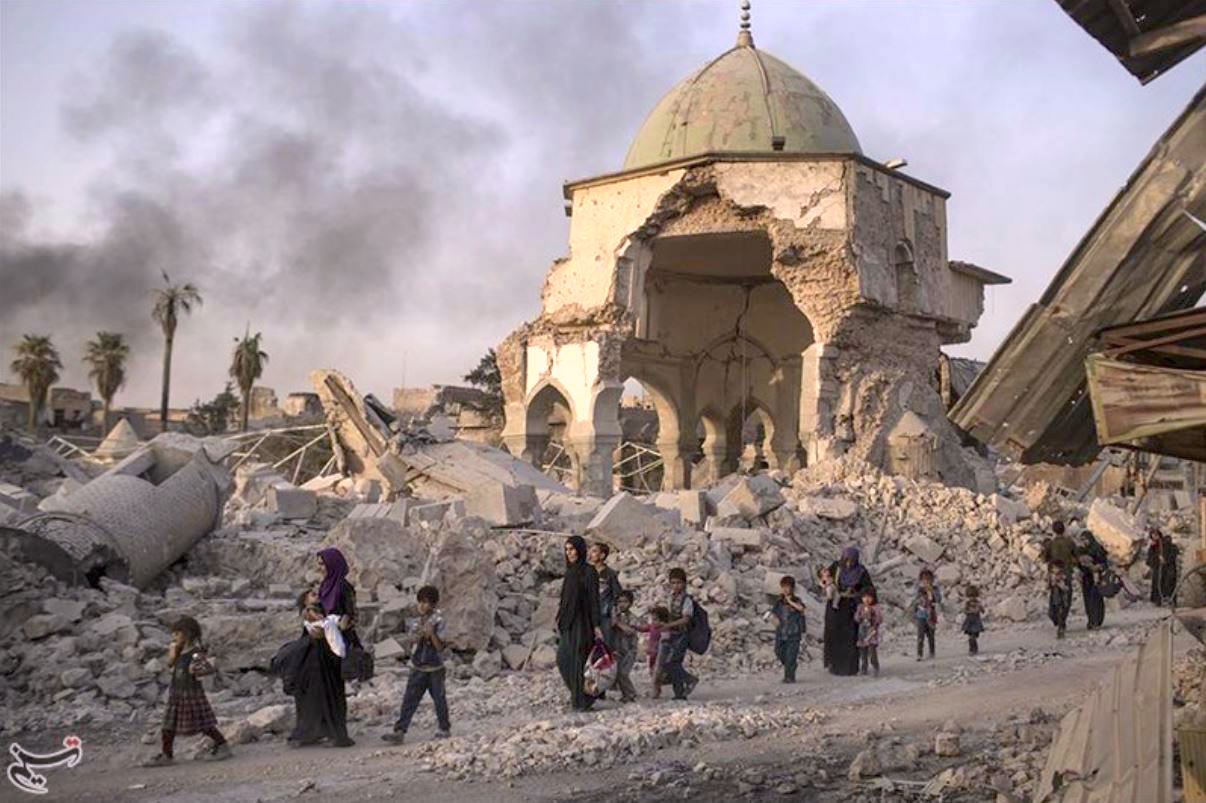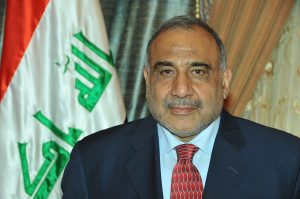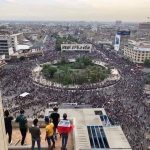by James J. Zogby
Fifteen years ago, we were still in the early stages of the US invasion and occupation of Iraq, “the war that would change everything.” Looking at the Middle East today, I feel an overwhelming sadness as I consider the far-reaching and devastating impact that the Iraq war has had on my country and the region and its peoples.
Neoconservatives had been aggressively pushing the Bush administration to launch a war against Iraq beginning immediately after the horrific terrorist attacks of September 11, 2001. They argued that America needed to forcefully respond to the attacks in order to demonstrate that we were not to be trifled with. A decisive show of strength, they claimed, was necessary to clearly establish America’s hegemony and to forestall any move toward multi-polarity in the post-Cold War era.
It bears repeating that the war was based on lies, and by that I don’t mean the lies about Saddam’s nuclear program or his connection to the 9/11 terrorists. Rather the more insidious lies were: that the “war would be a ‘cake walk,'” that it wouldn’t require a significant troop commitment or expenditure of resources, that it would be over quickly, that we would be greeted as liberators, that democracy would take hold in Iraq, and that the entire Middle East would be transformed.
Fifteen years later, only one of these claims turned out to be true: the region would be transformed. But it was not the transformation envisioned by the neo-cons.
Again, it bears repeating just how devastating that war has been. The war itself exposed the deep fissures in Iraqi society, while the US occupation’s uninformed bungling only served to exacerbate these divides. With Iraq’s army and ministries dismantled, the country fell into chaos with competing sectarian militias unleashing a civil war. This resulted in the massive displacement of civilians—millions of whom became refugees or internally displaced—and the decimation of vulnerable religious minority communities. All of this occurred on Bush’s watch.
An additional tragic consequence of the war was the spread of extremism. Al-Qaeda, far from defeated, metastasized into newer and more deadly forms in Iraq, its immediate neighborhood, and countries beyond.
In this weakened and fractured Iraq, Iran found a foothold which it parlayed to its advantage. Today, Iran remains a major player in Iraq and not only there. Another unintended consequence of the war was the unleashing of Iran as a regional power.
Subdued, for a time, by its rival Iraq, Iran now felt empowered to extend itself beyond its borders. Preying on growing anti-American sentiment and sectarian tensions in other countries, “revolutionary Iran” was emboldened to meddle in regional affairs. This gave rise to the Arab Gulf states feeling the need to assert themselves against this growing and destabilizing Iranian threat.
The neocons’ war also emboldened Israel to more aggressively pursue its agenda to subdue the Palestinians and to expand its colonial enterprise.
The US, once seen as the dominant super power that had won the Cold War and built an international coalition to liberate Kuwait, now found itself bogged down in a war it could not win with its military weakened and demoralized by losses. The US also stood discredited in the Arab World as a result of its bloody failure and abhorrent behavior in Iraq and its stubborn refusal to confront its client/ally Israel.
The neoconservative’s blindness to Middle East realities did indeed give birth to a “New Middle East,” but it was exactly the opposite of the one they had imagined.
As the region descended into multiple new crises—with deadly wars in Syria and Yemen—the impact of the Iraq war became even more pronounced. Iran was a player in each of them. The Gulf states also became involved seeking ways to combat aggressive Iranian advances which challenged and threatened them. Al-Qaeda and its offshoots played an new and deadly role in Iraq and Syria. And new players like Russia and Turkey, each defending what they saw as their interests, also emerged as regional actors.
All the while, the US, weakened diplomatically and still licking its wounds from the war in Iraq, was too war weary and wary of becoming directly involved in new regional crises. Some blame the Obama administration for passivity. But this fails to recognize the reality that the post-Iraq, the US military cautioned against engagement in conflicts they could neither manage nor see how their entry, without a long-term commitment—in which they loathed to engage—could help bring about a resolution.
In this new chaotic multi-polar world, conflicts spin out of control, becoming more deadly and destabilizing as they grew. The Syrian conflict has taken the lives of a half-million while forcing over five million to become refugees. This has created new pressures in neighboring countries and unleashed an xenophobic tidal wave that is now challenging democracies in Eastern and Central Europe. And the battle in Yemen, which began as an effort to restore the legitimate government that had been overthrown by a rebel faction, has morphed into a draining regional conflict and a humanitarian disaster.
And so here we are fifteen years later, with the US reduced to playing a supporting role in a deadly conflict in Yemen and a backup role for minor players in Syria. The mono-polar world envisioned by the neo-conservatives has given way to a multi-polar region—with Iran, Russia, Turkey, the Gulf States, and the US all engaged, in varying degrees, in conflicts—all, seemingly, without end. This is the house that the Iraq War built.
At this point, one can only imagine what the Middle East would be like if fifteen years ago, we had not engaged in that foolish war. Iraqis might still be struggling against their dictator, but one million Iraqis would not have died and their society would not have been destroyed. Iran’s people would still be struggling against its regime, but Iran would be contained. And the US, its capacity for leadership and prestige still intact, would be in a position to play a far more constructive role in regional diplomacy and conflict resolution.
I write this not to “cry over spilt milk,” but as a cautionary note. Foolish wars have consequences with which we are forced to live. We need to learn from them in order to not be so foolish in the future.
James J. Zogby is the president of the Arab American Institute.






Apparently some foolish Americans now want rid of their leader, though he’s only had power for 18 months – but as we keep being told of the Assads, North Korea’s Kims, etc dynastic authoritarian rule under the Trump dynasty will ensure “stability”. No more room for dissent, no more of that liberal democracy which is so harmful to truly “stable”authoritarian rule – all those things will be “contained” under the Trumps in the style Mr. Zogby prefers; Americans may get Assad/Sisi-style rigged “elections”. I’m sure Donald can get tips from Assad, Sisi, Kim, Duterte, Putin and all the other genocidal despots and authoritarian leaders he and Mr Zogby so admire.
After all, since murderous authoritarian repression is Mr Zogby’s ideal for the Middle East – for “stability” he and other faux-liberal and faux-leftist Americans can hardly complain at the “stability” coming home – and he certainly needn’t worry about anyone ousting Trump. At least Trump’s toxic values, like Putin’s, are fully universal, at home as abroad. Funny how karma works.
Excellent article. “Foolish wars have consequences.” Well said. Retired Marine General and former CENTCOM commander Anthony Zinni was quoted as saying several years ago when the Bush Administration was pushing to expand our wars to include Iran – “if you like the wars in Iraq and Afghanistan, you will love a war with Iran.”
A good reminder of things past.
Zogby wrote the might-have-been, “Iran would be contained.” Isn’t the question now what can “we” do to stop the US administration from war with Iran? The intentions are more than clear. Leaks about US military preparations are beginning—the Australian news story, and Sec. Mattis’s ‘believable’ denial. The President believes he has the authority to proceed and the arsenal to “win.” Strongly voiced American public and world opposition to another “foolish war” is urgently needed. How to make that come about?
Dear Mr Zogby
How is it that the role of the United States, after all the bloodshed and massacre it has committed around the world, can be considered “constructive”, while the regional players that pursue their interests in their own neighborhood are portrayed as malign and aggressive?
And how can anyone call the policies of this particular POTUS “constructive”? Putting the actions of all the players in one category would have been a little unprofessional, but you have given support to the American while denouncing the other. You know the consequences of these policies better than most.
My thanks for the Article.
I admire Mr. Zogby’s analysis of IP conflict and his advocacy of the Palestinian cause. But when it comes to Iran he follows a “Sunni” i.e. Saudi line and adds fodder to neocon narrative against Iran. Iran’s actions have been defensive and intend to give strategic depth visavis USA, Israel and SAUDI/UAE aggressive intent. Even if we doubt Iran’s sincerity with regard to axis of resistance and its advocacy of Palestine cause, calling its actions aggressive is going above the board. Zogby will sound more credible if he criticizes SAUDI/UAE for stabbing Pals on the back.